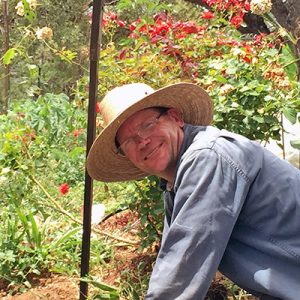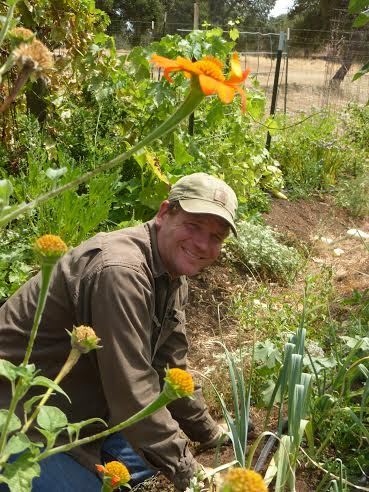Kevin Hesser
Farm to School Curriculum Trailblazer
 TITLE: Agriculture Teacher
TITLE: Agriculture Teacher
LOCATION: Calaveras Unified School District, San Andreas, California
IMPACT: Putting Calaveras County on the map for farm to school work, with thriving school gardens and farm to school curriculum throughout the district (and beyond!)
Kevin Hesser may not be as famous as say, Willie Nelson, but in the farm to school world, he is definitely a rock star. For almost two decades, he and his wife Autumn have been infusing hands-on gardening experiences into the curriculum and culture of the Calaveras Unified School District in San Andreas, California.
Kevin and Autumn met as kayaking guides in Alaska, coaxing timid urbanites into the water. The work sparked their desire to teach, and after moving back to the lower forty-eight, they married and pursued their teaching degrees together.
“One of the advantages of being a teacher,” says Kevin, “is the ability to gear the curriculum toward your passions.” Both Autumn and Kevin introduced lessons about food to their elementary school students slowly. Kevin started with a small garden of just three half-wine barrels outside his classroom. It didn’t take long for students’ enthusiasm in the classroom to bring the administration on board with a fuller farm to school program. Soon enough “engaging kids with their food became a backbone of our work as elementary teachers,” Kevin remembers.

Kevin Hesser in the garden. Photo © California Farm to School Network.
With 30% of Calaveras County in agricultural land, Kevin used their location to his advantage and brought students to farms for field trips, introducing firsthand experiences with farming and food production. Students, he realized, need hands-on lessons to complement the curriculum.
“There is power in that hands-on approach. A garden provides the inspiration and space that we need to learn. Kids are intuitive to that.”
In 2010, the Hessers joined a colleague to cofound Gardens to Grow In, a non-profit that promotes healthy and sustainable lifestyles in schools and communities by teaching children and families how to grow and prepare healthy food through school and community garden based programs.
A cultural shift took root in the community. Students dug deeper in the garden and were more engaged in the classroom. And it wasn’t only students; parents were also more engaged. In a low-income district, Kevin struggled to get parents into the classroom to volunteer. But the garden? Parents whom he had never met eagerly joined him there. Adventurous kids urged their hesitant parents to try new veggies. Parents would tell Kevin, “My kid says we’ve got to buy kohlrabi because we grew it in school.” Talk about purchasing power!
Kevin also found that there were always new ways to experiment. When he moved to the middle school and high school, Kevin got permission to create a cooking class designed around the garden. “There is power in that hands-on approach. A garden provides the inspiration and space that we need to learn. Kids are intuitive to that,” says Kevin.
Today, each of the nine schools in Calaveras Unified School District has an ecology lab and Kevin is a Regional Lead for the California Farm to School Network. Kevin recalls that when he started teaching about food, he had to get creative; there weren’t any programs to borrow from. Now sharing garden-based educational resources is much easier for teachers. With so many farm to school communities and resources out there, Kevin believes that anyone can be a champion for Farm to School.

Kevin’s advice for teachers:
Celebrate the Small Steps
- Be patient. Celebrating the small successes is important because this can be a slow process.
- Getting their hands in the dirt can get kids hooked on gardening and keen to learn more.
- Work with your supervisor. Tell them you’re passionate about farm to school and work with them to build classes around it.
Join Forces with Others
- Collaborate with interested colleagues, which can open doors to interdisciplinary curriculum development.
- Consider community partnerships that can expand your work. Kevin has worked with nonprofits of all sorts, such as the California Farm to School Network, LifeLab and FoodCorps.
- Engage parents. Kevin finds that many parents who are shy about volunteering in the classroom blossom in the garden. Parents are also great advocates who can push administrators to do more [See Parent Rock Star Jane Hirschi].
- Look for resources from your local government. When Kevin and Autumn went to trainings held by the California Department of Education, they were the only teachers there.
- Ask farmers to come in to talk to your students. Or better yet, bring the kids to the farm! Some farmers relish giving farm tours for field trips.
Leverage Enthusiasm
- Cultivate kids’ demand for fresh produce. Host tastings from the garden or start a Harvest of the Month program.
- One of the biggest roles teachers can play is working with food service. Talk to cafeteria staff about what it would take for them to buy from local farmers.
- Talk to farmers about having your school become a distribution hub for their CSA’s. In rural areas, this may make some families more willing to eat locally.
![]()
Farm to School Resources
Click here to see a complete list of Farm to School resources.



